Political Prisoners Transferred To Main Evin Prison in Tehran
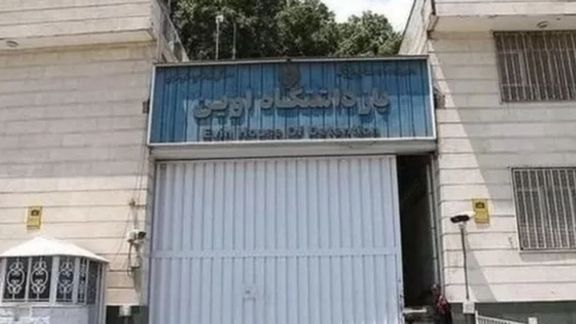
Iranian authorities have transferred female prisoners from two penitentiaries with harsh living conditions to the main Evin prison in Tehran, where they can be under better surveillance.

Iranian authorities have transferred female prisoners from two penitentiaries with harsh living conditions to the main Evin prison in Tehran, where they can be under better surveillance.
A few days after female political prisoners were transferred from Qarchak to Evin, the political prisoners of the Fashafouyeh prisonwere also transferred to Evin on Sunday.
The transfers from Qarchak, also known as Rey or Shahr-e Rey Women Prison on July 20, and Fashafouyeh, aka the Greater Tehran Central Penitentiary, to Evin both were carried out abruptly and without any explanation by the authorities.
Normally political prisoners demand to be transferred to Evin because that is where the Islamic Republic holds most of its political prisoners and Qarchak and Fashafouyeh are usually for people convicted of violent felonies and common criminals.
However, former political prisoner and civil rights activist Arash Sadeghi wrote on social media that the transfers were done with the aim of imposing restrictions and having more control on political prisoners rather than separating them based on crimes.
He added that for example there is limitations in access to telephones in Evin's women’s ward and the Ward Six of Evin – where the political prisoners of Fashafouyeh are held – is close to Ward 209 that belongs to the Intelligence Ministry, making it easier to put pressure and restrictions on the prisoners of conscience.
Moreover, considering the disastrous situations of the Qarchak and Fashafouyeh detention centers, which were being leaked out by the political prisoners, the Islamic Republic preferred to transfer them to Evin instead of closing or changing the conditions of these two prisons, he said, noting that in this way no more news from these two prisons will go out.
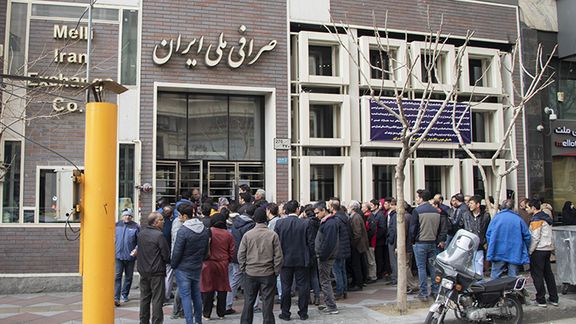
Iran’s revenues from oil and other exports have increased but so has the rate of capital flight, figures from the Central Bank of Iran (CBI) indicate.
The CBI report published last week indicates that in the fiscal year ending March 20, 2022, the country's revenues from exporting oil, gas, as well as oil and gas products and by-products, amounted to nearly $39 billion, $17 billion more than the previous fiscal year when oil prices were much lower.
The 84% increase in oil export revenues, however, was accompanied by a nearly 50% increase in capital flight in comparison with the previous fiscal year (ended March 20, 2021) as trust in the local economy and the political future of the country appeared to have diminished.
According to the latest OPEC figures, Iran earned more than $25 billion from selling crude oil in 2021. There have been numerous reports since late 2020 that Iran has been selling more oil, clandestinely, despite US sanction. Iranian shipments increased from as low as 200,000 barrels per day in 2019 to as high as more than one million barrels in January 2022. In 2020 Iran earned only around $8 billion due to enforcement of US sanctions.
The precise amount of capital leaving Iran is very difficult to calculate but it can be deducted from the official data on net capital account deficit. According to the CBI’s latest report, the net capital account deficit stood at $9.3 billion during the fiscal year ending March 20, 2022.
The hard currency outflow from the country is invested in various ways including in real estate, stocks, bonds, cryptocurrencies, or establishing of companies abroad. Investment in neighboring countries is particularly popular. The high rate of inflation and the huge drop in the value of the national currency have also hugely contributed to the urge to invest in such markets instead of domestic production and services.
In January this year Iran's central bank said that over $6 billion had been taken out of the country in six months (March 21-Sept. 20, 2021) because of political and economic uncertainty.
One of the indications of capital flight from Iran is the popularity of property acquisition in neighboring countries such as Turkey, the United Arab Emirates, and Georgia which often goes hand in hand with business investments.
According to a report by the state broadcaster’s Young Journalists Club (YJC) in April, the value of assets held by Iranians abroad was estimated at between 3 to 4 trillion dollars in 2015, about 10 times the country’s gross domestic production.
Experts say CBI figures indicate that Iranians are fearful about the safety of their investments despite promises of government officials last year that the 2015 nuclear deal, Joint Comprehensive Plan of Action (JCPOA) would be restored.
They argued that the administration of President Ebrahim Raisi does not tie the economy to the outcome of the nuclear talks and restoration of the JCPOA and therefore, the economy would not be damaged even if the talks to restore the deal failed and US sanctions continued.
Iran has also struggled to attract foreign investment since the United States withdrew from the 2015 nuclear deal and slapped sanctions on oil exports, international banking, and officials of the Islamic Republic. Any entity worldwide supplying dollars to Iran is vulnerable to punitive US action.
According to official figures, Iran's net capital account balance was positive from 2001 to 2005 when there was foreign investment. But in the following years, except in 2014, the balance has been in the negative.
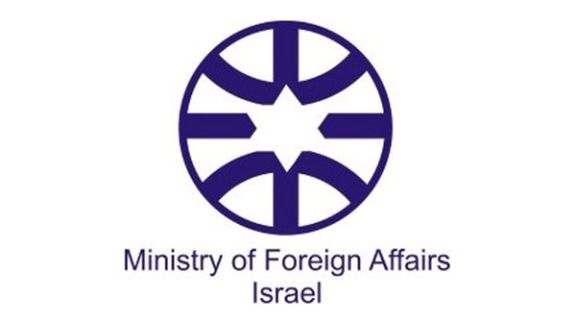
Israel has called on the international community to "stop" the nuclear program of the Islamic Republic before it is "too late".
In a tweet on Sunday, the Israeli Foreign Ministry said that “a nuclear Iran is not a threat only to Israel, but to the entire region and the world.”
Echoing remarks by the head of the UN nuclear watchdog, the International Atomic Energy Agency (IAEA), Rafael Grossi, the ministry said, "Today what we have is a nuclear program that has grown enormously....” and a country that does not seek nuclear weapons would not enrich uranium to 60 percent.
On July 22, Grossi told Spain's El Pais newspaper that the Islamic Republic’s nuclear program is "galloping ahead" and the IAEA has very limited visibility on what is happening.
In 2019, Iran began breaching restrictions on its nuclear program following the 2018's pullout of the United States from the 2015 deal, the JCPOA, or the Joint Comprehensive Plan of Action. The process accelerated after President Joe Biden’s administration signaled it was ready to return to the JCPOA.
“If there is an agreement, it is going to be very difficult for me to reconstruct the puzzle of this whole period of forced blindness,” Grossi said. “It is not impossible, but it is going to require a very complex task and perhaps some specific agreements.”
Iran would like to see a nuclear agreement taking shape soon, but it will not act with emotion and haste, Iran’s foreign ministry spokesman Naser Kanaani said Monday.
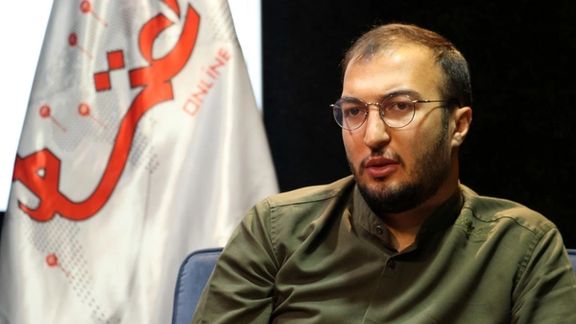
A whistle-blower who had exposed wrongdoing and violations by a few senior conservative political figures in Iran has been handed a jail sentence for two years.
Vahid Ashtari, a young man who is a member of Edalat Khahan [Justice Seekers], a political group of mainly university students who are loyal to Iran's Supreme Leader Ali Khamenei, released a video on social media on Sunday, July 24, to warn others that whistle-blowing could be costly.
Ashtari also posted a court ruling based on which he has been sentenced to two years in jail for "spreading lies and disturbing the public's peace of mind." However, he said that he was never officially indicted.
In April this year, Ashtari revealed that the family of Majles (parliament) Speaker Mohammad Bagher Ghalibaf had visited to Turkey to buy baby clothes and accessories for Ghalibaf's daughter who was pregnant at the time. He also claimed that Ghalibaf’s wife, daughter and son-in-law arrived at Tehran’s Imam Khomeini airport from Istanbul with apparently a large layette set they bought from Turkey. People at the airport didn’t recognize them at first but when a photo of the family circulated on social media, their identity was revealed.
The accusations were followed by a barrage of criticism, and resurfacing of other alleged corruption cases against the family including spending hefty amounts on purchasing properties in Istanbul. Ghalibaf's family and some of the country's officials and political figures initially denied the report but after a while they gradually confirmed Ashtari's account.
Earlier, Ashtari and his colleagues in the Justice Seekers group had made revelations about the role of one of President Ebrahim Raisi's relatives, Meysam Nili, in giving government jobs to people close to them, and called the case "Meysam Gate."
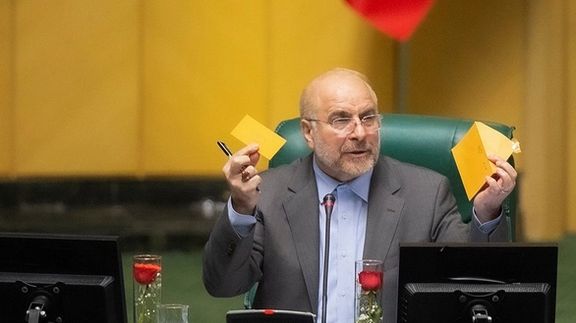
In his video and social media posts on Sunday, Ahtari welcomed his arrest and questioning at police stations, security organizations and courtrooms and said "It is good that young hardliners go to these places and find out what happens to activist workers and teachers and see the true nature of the religious political system 43 years after the 1979 Islamic revolution."
He called on Hezbollahis [hardline political activists who support the Islamic Republic and its leader] to pay special attention to this case and read the ruling.
Ashtari said: "Even after reading it, you may still not understand it because it is not a court ruling. It is a political editorial. But if your objective is to reform the appearance of the religious political system, you can see for yourself the true nature of the regime and how Islam works in the Judiciary and security system."
He "suggested to the devoted youths who blindly defend everything in the regime to find out what is going on behind the façade of Islam, sanctities and martyrs the officials take advantage of." However, he promised that "the situation in Iran will not remain like this."
The court ruling shows that Ashtari has also been accused of "discrediting state officials and mudslinging against them, portraying the country in a bad light and ridiculing a headline in Khamenei's official website."
Iranian analyst Ehsan Mehrabi told Iran International TV in London that although an official indictment has not been issued and Ashtari is entitled to an appeal, the reason why he has been given the jail sentence is that powerful officials wanted to send a message to all that no one, even a well-known conservative figure devoted to Khamenei, can get away with levelling accusations against regime insiders.
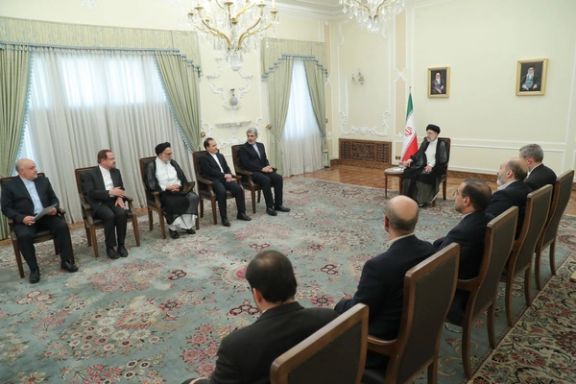
The Islamic Republic appointed Sunday Saeed Iravani, a former deputy of the country’s top security official Ali Shamkhani, as Iran’s new ambassador to the United Nations.
Iravani, who will replace Majid Takht-Ravanchi, served as a deputy of Shamkhani, the secretary of Iran's Supreme National Security Council (SNSC), for nine years. Majid Takht-Ravanchi was among the last officials appointed by former foreign minister Mohammad Javad Zarif, who led the Iranian negotiations with P5+1 countries which produced the 2015 nuclear deal – or the Joint Comprehensive Plan of Action.
Iravani also served as Iran’s chargé d'affaires in Iraq and secretary of Iran’s Strategic Council on Foreign Relations. He has career overlaps with current lead nuclear negotiator Ali Bagheri-Kani – as both served as SNSC deputies. He is the first Iranian ambassador to the UN with extensive SNSC experience. Iravani's diplomatic assignments -- spearheading the Saudi-Iranian dialogue in Baghdad and his experience as chargé d'affaires -- have been more regionally focused than his predecessors to date.
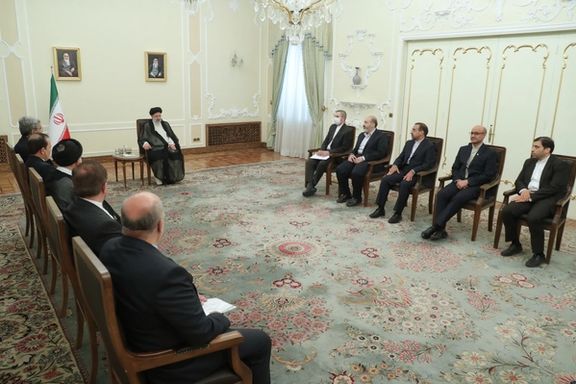
President Ebrahim Raisi also appointed new ambassadors to six countries – Georgia, India, Lebanon, Czech Republic, Poland, and Sierra Leone -- on Sunday, practically cleansing the diplomatic roster of appointees from the administration of former president Hassan Rouhani. A cleric, Khalil Sadati Amiri, was named as Iran's ambassador to Sierra Leone.
Moreover, Raisi appointed Ali Bahraini as Tehran’s permanent representative to the UN Office and other international organizations in Geneva.
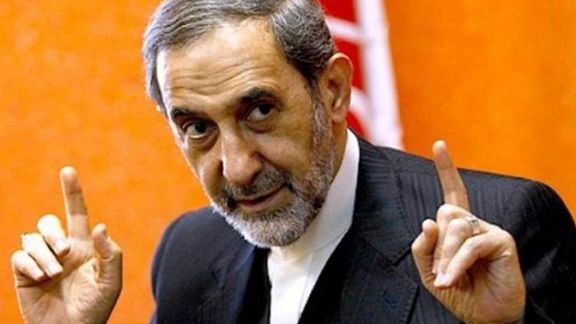
Although Iran had declared a pro-East policy in 2018, its reliance, particularly on Russia became more evident during a visit by Vladimir Putin on July 20.
Following the visit, which Washington said "proves Moscow's isolation," and some Iranian analysts characterized as an indication of Iran's isolation, reformist daily Arman Emrooz in Tehran summarized both sides' arguments in a Saturday, July 23 report that called Iran's move an unwelcome development.
Nonetheless, Supreme Leader Ali Khamenei’s supporters have exhibited endless fascination with Russia and Putin's charm offensive during his latest visit.
The Supreme Leader's senior international affairs adviser Ali Akbar Velayati, who was dozing off while Khamenei and Putin were talking through interpreters, has said: "What do reason and wisdom tell us? Should we go toward the West that has always been our enemy? Or should we go toward the East that has always helped us as much as it could?"
Velayati claimed elsewhere: "Putin believes in spirituality. Previous Kremlin leaders were Godless, but now from Putin to lower officials are either Christian or Muslim."
As if this was not enough, Assembly of Expert member Ahmad Hossini Khorasani said: "Putin's modest gestures in front of Khamenei was like a pupil's sitting in front of his teacher, and that is an honor for Islamic Iran."
International relations expert Ali Bigdeli, however, told Arman Emrooz that that Iran's reliance on the East is a strategic mistake and certainly against Iran's national interests. However, he noted that anti-Americanism has always been part of Tehran's policy since the 1979 revolution, but the government of President Ebrahim Raisi has escalated the anti-US policy.
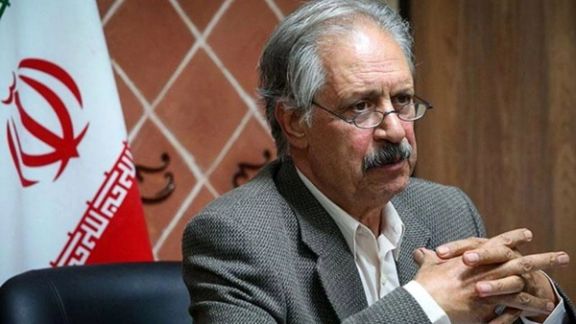
Further evidence of Bigdeli’s criticism emerged Sunday when two hardliner media outlets called for “pre-emptive” defense against the West and in support of Russia in the Ukraine war.
Referring to Russia's track record of broken promises and hypocrisy in its relations with Iran before and after the 1917 Russian revolution, Bigdeli said that Iran should have taken a lesson from Russia's invasion of Ukraine.
Meanwhile, Bigdeli warned that Russia is not capable of meeting Iran's economic needs and noted that Moscow has already failed to fulfil its commitments in nuclear, air defense projects and other projects. Bigdlei said that the latest visit by Putin simply showed that he was isolated in the world following the invasion of Ukraine and was pretending that he has found a major ally in Tehran.
He warned that Iran should not land in Russia's lap as a result of its enmity with the West. He noted that Iran currently needs $200 billion to reconstruct its oil industry but Russia and even China are incapable of providing funding for that project.
International relations expert Hassan Hanizadeh told the daily that "Iran's ‘Looking East’ policy was a choice between bad and worse." However, he justified the move as "an outcome of broken promises on the part of the United States" and said that "Iran started to seriously align its policy with those of Moscow only after former US President Donald Trump pulled the United States out of the nuclear deal with Iran in 2018."
"As the Vienna talks ended in a deadlock, the current government of Iran is now keener to follow the Looking East policy as US sanctions badly affect the country's economy, and the West's broken promises have pushed Iran to get closer to Russia and China," Hanizadeh said.
Ultraconservative analyst Foad Izadi on the other hand argued that getting close to Russia can serve Iran's major national interests. He said pro-Western analysts describe the current situation as Iran's reliance on Russia and China, but he claimed Iran is simply maintaining relations with them and is not building reliance.
However, Izadi warned that Iran should not get itself entangled in dichotomies such as choosing between reviving the JCPOA or relying on Russia.